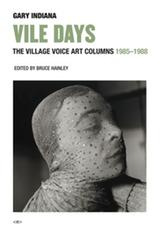 Gary Indiana, "the elfin novelist, cultural critic, playwright and artist whose crackling prose and lacerating wit captured the ravages of the AIDS crisis, Manhattan's downtown art scene, lurid true crimes and his own search for love," died October 23 at age 74, the New York Times reported. Indiana was the author of more than 10 books of fiction, memoir and criticism, "all of which tackled, in one way or another, a culture careering toward ruin."
Gary Indiana, "the elfin novelist, cultural critic, playwright and artist whose crackling prose and lacerating wit captured the ravages of the AIDS crisis, Manhattan's downtown art scene, lurid true crimes and his own search for love," died October 23 at age 74, the New York Times reported. Indiana was the author of more than 10 books of fiction, memoir and criticism, "all of which tackled, in one way or another, a culture careering toward ruin."
Indiana arrived in New York City in 1978 and "began churning out poetry, film reviews and essays for indie presses, hoping to find his way as a playwright and novelist," the Times wrote. In 1985, Indiana became the arts editor of the Village Voice. For the next two and a half years, he upended "the pompous traditions of the form. It was, as he wrote later, a time of terrible emergency, and he used his essays to explore his rage at the government's indifference to the AIDS crisis and at an art world veering from joyous eclecticism to a grimly corporate market ethos."
Indiana disavowed his art criticism after he quit the Voice in 1988. "It had made him a star in a world that he hated--the amped-up, hyper-capitalist art world," the longtime editor Ira Silverberg, once one of Indiana's publishers, said. "He was a Marxist at heart, and he retreated into fiction, which is where he wanted to be anyway."
Indiana was best known for his lightly fictionalized American true-crime trilogy Resentment, Three Month Fever, and Depraved Indifference. Resentment: A Comedy (1997) uses the Los Angeles trial of the Menendez brothers as its backdrop; Three-Month Fever: The Andrew Cunanan Story (1999), explores the life of the serial killer who murdered fashion designer Gianni Versace; and Depraved Indifference (2001) is based on the mother-and-son murderers Sante and Kenneth Kimes.
"In the summer of 2017, the writer Bruce Hainley set out to exhume Mr. Indiana's columns from copies of The Voice that had been stored on microfilm in the library at the University of California, Los Angeles," the Times wrote. "After typing them up, he put them on a hard drive and gave it to Hedi El Kholti, an editor of Semiotext(e), the avant-garde publishing house. Mr. El Kholti then persuaded an extremely ambivalent Mr. Indiana to allow him to publish the collection. Vile Days: The Village Voice Art Columns 1985-1988, edited by Mr. Hainley, appeared in 2018. Semiotext(e) had earlier published some of Mr. Indiana's out-of-print novels, earning him a new generation of reverent readers."

